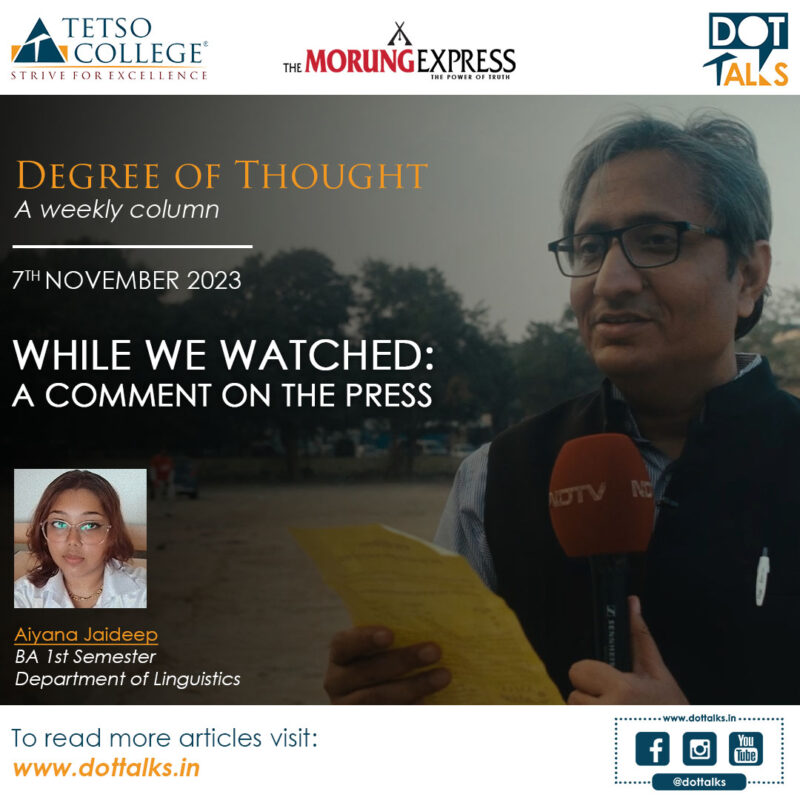While We Watched: A Comment on the Press
“While we Watched” is a documentary film by Vinay Shukla, on the life of Prime Time Indian TV journalist, Ravish Kumar, singularly known for his succinct and straight line approach to presenting the truth in its pristine form without spot or blemish. While indications show a section of the press trading in their commitment to the truth, the freedom of press has seen its steady decline in the country. Ravish Kumar, on whom the documentary is made, continues to stand steadfast, steady and resolute, and finds himself as the object of rising pressure from more than one quarter.
The influence the press holds is unparalleled and must always be the resolute commitment to the truth. Not the well rounded version of what sounds like and appears to be the truth. We can see this actively playing out with relation to the documentary. When the issue of Pakistani bombings claiming the lives of Indian soldiers arose, various news channels simply catered to the emotional coddling of the country, rather than giving apt information about the situation. There is no denying that what happened to our soldiers was a terrible thing, but it is crucial to keep one’s head about themselves in this predicament. In the film, Ravish Kumar showcases the reality of a remote village. They were promised various commodities such as running water, electricity and adequate garbage disposal in the run up to the elections. Ravish Kumar went back to the same village after the elections and sadly, the villagers were still living in the same pathetic conditions, nothing seemed to have changed.
Unprofessional journalism is what has had the country in a tight grip for a long period of time. The freedom of the press is being lost day by day, reducing the impact of the truth. Reporters and journalists have their integrity put to the test on a daily basis, as they are left to choose whether to toe a line or face the flack. In the North East of India, specifically in Nagaland, journalism is fairly trustworthy. There is freedom to report on all sorts of religious activities as well, as is not the case in the rest of India. However, this does not mean that the press in Nagaland does not face any issues. Many articles were published in celebration of World Press Day, where the concerns of journalists were put out for the public to read.
An article from the Mokokchung Times on the 3rd of May said, “In Nagaland, the press faces a series of challenges although government interference is not significantly one of them. However, it is difficult to give a free check to press freedom in Nagaland as the freedom of press in Nagaland is curbed by factors that are unique to Nagaland.” It also stated that journalists in Nagaland have a concern for their freedom and financial security. The paper also puts forth the opinions of senior journalist of Tir Yimyim, Sashimeren Jamir, who has over sixteen years of experience in journalism. According to him, and I quote, “Because Nagaland is small and because we are a tribal society, whenever a media house speaks against someone or exposes someone of their wrong doings, the pressure from the near and dear ones and the community is too overbearing.”
Indian media houses mainly strive for high TRP and financial support from the government and corporate ad agencies. The interference of the government has deteriorated the publishing of truth in the media. This damages the political front of calling India a democracy, when in fact one is not allowed to have an opinion. Ironically the press is one of the pillars of a democracy, the other three being legislature, judiciary and executives. The very purpose of having a democracy is being shot in the foot with the current situation of media professionals in the country.
The Preamble of the Indian Constitution guarantees freedom of thought, speech, and expression for all Indian citizens. As freedom of the press is not explicitly enshrined in the Indian Constitution, the media derive their rights from Article 19 (1) (a) of this document, which deals with freedom of speech and expression. Press freedom is essential for democracy, and it is particularly important in a large democracy like India. Due to the absence of a specific provision safeguarding press freedom in the constitution, the courts in India promoted and protected press independence. Therefore, the media has the same right to write, distribute, flow, and communicate as any other person.
The media is essential in a democracy for disseminating news and information about national and international news. The media’s role has evolved into being utterly pivotal to the potent operation of democracy, and it helps shape public opinion on issues and themes. It is presumed that the media represents the people and scrutinises the government.
Degree of Thought is a weekly community column initiated by Tetso College in partnership with The Morung Express. Degree of Thought will delve into the social, cultural, political and educational issues around us. The views expressed here do not reflect the opinion of the institution. Tetso College is a NAAC Accredited UGC recognised Commerce and Arts College. Currently, the Degree of Thought Column is managed by the Department of Mass Communication, and the editorial team are K.C. Gabriela, Asst. Professor; Dr. Maria Lalmuankimi, Asst. Professor; and Rinsit Sareo, Asst. Manager, IT, Media & Communications.
For feedback or comments please email: dot@tetsocollege.org


